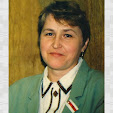A Needle Pulling Thread, Issue #63 (2023) Traditions
-публікацыя ў часопісе-
Kaliada Goat.
"Калядная Каза".
Гэта работа была ўдзельнікам
канадзкага трохгадовага вандроўнага шоў-выставы “Threadworks 2016”. Работы для яго адбіраліся на конкурснай падставе з усёй Канады.
У беларускай культуры каза ёсць сакральнай, чароўнай жывёлай, якая можа зрабіць чалавека паспяховым проста сваёй прысутнасцю ў ягонай гаспадарцы. У фальклоры гаворыцца: “Дзе каза нагой – там жыта капой, Дзе каза рогам – там жыта стогам”.
Культ казы шануецца цягам зімовых святкаў, а менавіта
падчас зімовага сонцазвароту, калі стары год сыходзіць, і новы год пачынаецца.
У беларускай мове гэтае свята мае назу “Каляды”, што
паходзіць ад слова “кола”.
Гэта вельмі вясёлы час, калі ўбраныя ў дзіўныя касцюмы людзі
ходзяць групамі ад хаты да хаты, выпрошваюць у гаспадарой гасцінцаў, спяваючы
калядкі ды водзячы з сабой чароўную “казу”, каб яна пахадзіла па гасподзкім
двары.
У маю версію Каляднай Казы, я улучыла некалькі сакральных
беларускіх сымбаляў, звязаных з зімовымі святкамі –
- сама каза,
- Батлеемская зорка, што сымбалізуе нараджэнне Хрыста,
- геаметрычны знак “Сонца”,
- знак “Продкі”,
- сымбалі багацця і дабрабыту.
Для пазнакі зімовага сонцазвароту на Казінай пысе змешчаны знак “Завяршэння” – заканчэння году. А на Казіным ілбе – знак “Пачатку”.
На самым версе размешчаны знак самой Каляды.
Па баках дызайна ёсць дзва надпісы. Яны зроблыныя Беларускімі стылізаванымі шрыфтамі. Літары чытаюцца зверху ўніз. Надпіс справа чытаецца як “Merry Christmas!”, надпіс злева – “Вясёлых Каляд!”
*Belarusan Traditional Stitching Motifs, або Беларускія стылізаваныя шрыфты – гэта кірылічныя і лацінскія шрыфты, заснаваныя на матрыцы беларускага арнаменту, якія распрацаваў беларускі філосаф і лінгвіст Міхаіл Баярын.
Іх можна знайсці тут
Набыць схему ў краме Etsy Іншыя публікацыі ў ANPT
--------------------------------------------------
The piece was a part of the juried ‘Threadworks 2016’ three-year Traveling Show.
In Belarusan culture, the goat is the sacred, magical animal believed to easily make a person successful just by its presence in one’s personal space. The folklore says, "Where the goat walks, there rye grows. Where the goat horns point, there is harvest growth".
The goat is worshiped during the winter holiday season, namely the winter solstice
time, when the old year comes to an end and a new one begins.
In the Belarusan language, this
holiday is called 'Kaliady' from the word 'kola' meaning
a circle.
This is fun-filled time of the year when it’s customary for
groups of people dressed in fancy clothes to solicit food door-to-door by
singing carols, leading the magic “goat” around the master’s house for him to
have a good harvest next year.
In my version of the Kaliada Goat design, there are
several sacred Belarusan symbols connected to the winter holiday season –
- the goat itself,
- the star of Bethlehem symbolizes Jesus's Birth and Christmas,
- the geometrical sign of The Sun,
- the signs of Ancestors,
- symbols of Wealth and Well-being.
To mark the winter solstice, the sacred symbol for the
Completion of the year is embroidered on the Goat’s snout and that of the
beginning of the new year (appearing, sprouting, springing) is embroidered on
its forehead.at
At the very top is the solar sign of the Kaliada.
There are two inscriptions at both sides of the design. They are
made in Belarusan Traditional Stitching Motifs Font*, and the letters are read
from top to bottom). The inscription on the right says, “Merry Christmas!”, and
the one on the left, “Merry Kaliada!” in Belarusan.
*Belarusan Traditional Stitching Motifs Font is a stylization of the Cyrillic
and Latin alphabets based on the patterns of the Belarusan ornamental strips on
belts and towels. It has been created by Belarusan philosopher and linguist
Mihail Bayaryn.
It can be found on the page HERE
The Kaliada Goat Pattern is available on Etsy




No comments:
Post a Comment